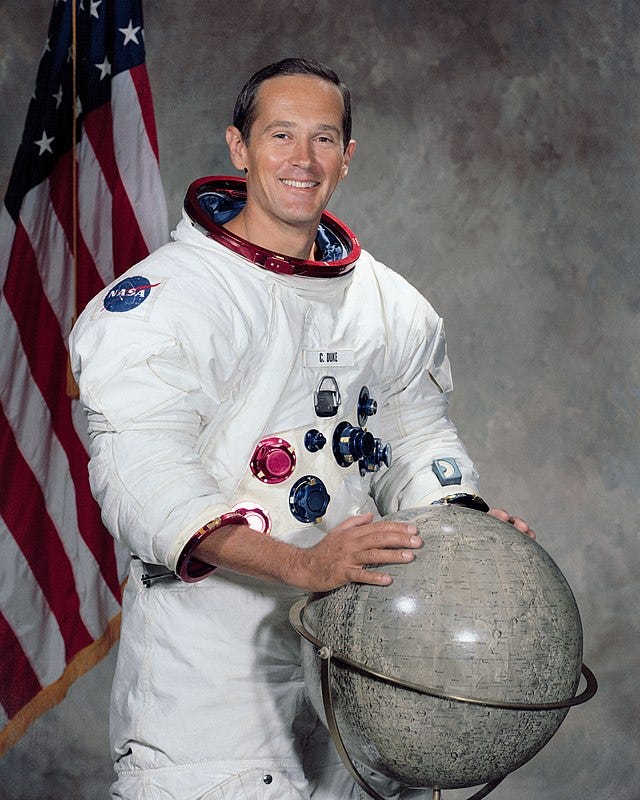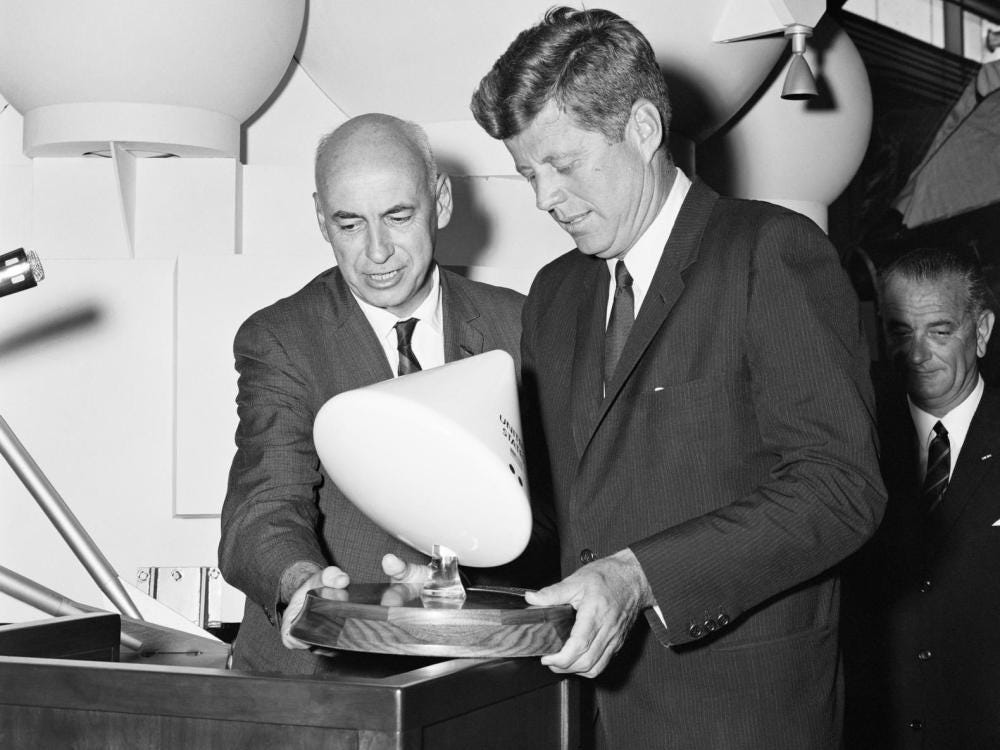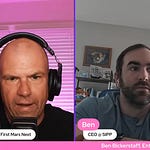We Hit a huge milestone 100 Episodes. We thank you for journeying with us.
Hope you can continue to support us and help us get to Mars one day.
We felt there was nothing more appropriate for our 100th episode / mission on the moon, not Mars yet but making great progress.
This is the photo that Charlie Duke brought with him and left on the moon. He had to take a picture of it as the moon’s surface is too hot and too cold for earthlings and earth stuff (Temperatures near the Moon's equator can spike to 250°F (121°C) in daylight, then plummet after nightfall to -208°F (-133°C).)
Duke in September 1971
Charlie Duke’s Bio: Charlie Duke's Bio via Wikipedia
What was The Race to Space?
Charlie Duke's Moonwalk Experience
EVOLUTION OF ROCKETS
Overview: Charlie Duke shares his exhilarating experience of walking on the moon during the Apollo 16 mission, highlighting the awe and wonder of being on the lunar surface.
Key Moments:
Awe of the Lunar Surface: Duke describes the surreal and magnificent landscape, emphasizing the sense of isolation and the beauty of the moon.
Scientific Exploration: He explains the scientific objectives of the mission, including collecting rock samples and conducting experiments to understand the moon's composition and history.
Personal Reflections: Duke shares personal anecdotes, including the famous incident where his fellow astronaut’s wedding ring was lost and later found on the moon's surface.
Phantom Space's Vision
Mission Statement: Jim Cantrell discusses Phantom Space's mission to become the Henry Ford of space, aiming to apply mass manufacturing techniques to launch vehicles and satellites to reduce costs and increase accessibility to space.
Strategic Goals:
Mass Manufacturing: Cantrell explains how Phantom Space aims to bring the cost down and speed up production by applying principles from the automotive industry.
Accessibility: By lowering costs, Phantom Space seeks to democratize access to space for various entities, including small businesses and educational institutions.
Innovation: The company focuses on innovative solutions to streamline processes and enhance efficiency in the space sector.
Efficiency in Space Ventures
Capital Efficiency: Jim Cantrell emphasizes the importance of capital efficiency in space ventures, noting that Phantom Space has managed to approach their first launch with significantly less funding compared to their peers.
Key Strategies:
Cost Management: Cantrell highlights the company’s ability to achieve milestones with minimal expenditure, contrasting this with the higher costs faced by other companies.
Lean Operations: Phantom Space employs lean operational strategies to maximize output while minimizing waste, drawing parallels to successful manufacturing techniques in other industries.
Funding Approach: Cantrell discusses the company's funding strategy, focusing on strategic investments and partnerships to sustain growth without excessive capital burn.
Space Industry Ecosystem
Building an Ecosystem: Phantom Space is building an ecosystem that includes launch vehicles, satellite manufacturing, and their own satellite constellation called Phantom Cloud, positioning themselves as key players in the small satellite market.
Components:
Launch Vehicles: Development of cost-effective and efficient rockets designed for small satellite launches.
Satellite Manufacturing: In-house production of satellites to meet the growing demand for small satellite services.
Phantom Cloud: Creation of a satellite constellation to provide services such as internet connectivity and data collection, enhancing their market presence.
Intergenerational Inspiration
Connection between Generations: The podcast highlights the connection between the pioneering efforts of astronauts like Charlie Duke and the new generation of space entrepreneurs like Jim Cantrell, emphasizing the continued inspiration and advancement in space exploration.
Inspirational Legacy:
Apollo Program’s Impact: Duke’s experiences and stories from the Apollo missions continue to inspire and motivate the new generation of space enthusiasts and professionals.
Modern Pioneers: Cantrell and his peers represent the modern era of space exploration, building on the foundations laid by early astronauts and pushing the boundaries of what is possible.
Future Prospects: The podcast underscores the importance of intergenerational knowledge transfer and the shared vision for advancing human presence in space.
Brief History of Space Exploration
Pre-Space Race Era
Early Astronomy:
Ancient civilizations such as the Greeks, Chinese, and Mayans made significant contributions to astronomy, developing early star maps and calendars.
Telescope Invention:
In 1609, Galileo Galilei used a telescope to make groundbreaking observations, including the moons of Jupiter and the phases of Venus.
Rocket Technology:
The 20th century saw the development of rocket technology, with pioneers like Robert Goddard in the US and Konstantin Tsiolkovsky in Russia laying the groundwork for modern rocketry.
Current Space Landscape
Leading Countries:
The United States, Russia, China, and the European Space Agency (ESA) are major players in space exploration, each with their own space programs and ambitions.
Private Companies:
Companies like SpaceX, Blue Origin, and Phantom Space are revolutionizing space travel with innovative technologies and cost-effective solutions.
Collaborative Efforts:
International cooperation is evident in projects like the International Space Station (ISS) and joint missions to Mars.
Phantom Space Activities
Phantom Space’s Goal:
To democratize access to space by focusing on mass manufacturing of launch vehicles and satellites.
Business Model:
Launch Vehicles: Developing cost-effective and efficient rockets to launch small satellites.
Satellite Manufacturing: Building satellites to cater to the growing demand for small satellite launches.
Phantom Cloud: Creating their own satellite constellation to provide services such as internet connectivity and data collection.
Biographies
Charlie Duke
Background: Graduated from the United States Naval Academy and served as a fighter pilot in the Air Force.
NASA Career: Joined NASA in 1966, worked on multiple Apollo missions, and walked on the moon during Apollo 16.
Current Role: Involved in supporting new space ventures like Phantom Space.
Jim Cantrell
Background: Mechanical engineer with experience working on a joint Soviet mission to Mars.
SpaceX: worked closely with Elon Musk in the early days of SpaceX.
Entrepreneurship: Founded several space companies, including Phantom Space, with a focus on efficient space ventures.
Space and Health
Medical Innovations: Development of advanced medical devices and diagnostic tools.
Telemedicine: Improved communication technologies for remote healthcare delivery.
Environmental Monitoring: Enhanced satellite imaging for tracking climate change and natural disasters.
Water Purification: Technologies developed for space missions are used for clean water solutions on Earth.
Detailed Summary of the Podcast
Introduction
Welcome and Introduction: The podcast begins with a warm welcome to the guests, Charlie Duke and Jim Cantrell. The host expresses excitement about having a former astronaut and a key player in the new space industry. Charlie Duke is introduced as one of the few people who have walked on the moon, and Jim Cantrell as a significant figure in the space sector, notably with his work at Phantom Space.
Charlie Duke’s Background and Experience
Career Overview: Charlie Duke provides an overview of his career, starting with his graduation from the United States Naval Academy and his subsequent service as a fighter pilot in the Air Force. He details his journey to becoming a test pilot, earning a master's degree from MIT, and his eventual selection as a NASA astronaut in 1966. Duke describes his involvement in five of the nine Apollo missions, including his role as Capcom during Apollo 11 and his own moonwalk during Apollo 16.
Jim Cantrell’s Career Path
Unique Career Path: Jim Cantrell shares his unique career path, beginning with a degree in mechanical engineering and his work with the French Space Agency on a joint Soviet mission to Mars. He recounts the pivotal moment when Elon Musk contacted him in 2001, leading to the founding of SpaceX, where he was the fourth employee. Cantrell discusses his subsequent ventures, including founding StratSpace and his involvement in various space companies, culminating in the creation of Phantom Space.
Phantom Space’s Mission and Vision
Mission Explanation: Jim Cantrell explains Phantom Space’s mission to democratize access to space by applying mass manufacturing techniques to reduce costs and increase efficiency. He outlines their three-part business plan: developing launch vehicles, building satellites, and creating their own satellite constellation, Phantom Cloud. Cantrell emphasizes the importance of capital efficiency and their goal to launch their first vehicle within a year and a half, having spent significantly less than their peers.
Charlie Duke’s Involvement with Phantom Space
Excitement about New Ventures: Charlie Duke discusses his excitement about being involved in a new space venture like Phantom Space. He shares his initial meeting with Jim Cantrell and his fascination with Phantom Space’s concept. Duke mentions his current role in helping with the financial side and providing professional advice as needed.
Importance of Efficient Capital Use in Space Ventures
Capital Efficiency Explanation: Jim Cantrell elaborates on the importance of efficient capital use in the space industry. He contrasts Phantom Space’s approach with the significant expenditure by other companies, highlighting their ability to move forward with relatively minimal funding. Cantrell draws parallels between the space industry and automotive manufacturing, emphasizing the need for reliable and cost-effective solutions.
Reflections on Apollo and New Space Ventures
Personal Reflections: Charlie Duke reflects on the Apollo missions, sharing personal anecdotes, including the famous wedding ring incident during Apollo 16. He recounts the exhilaration of walking on the moon and the subsequent challenges of returning to Earth. Duke highlights the importance of the Apollo program and its enduring legacy in inspiring new generations of space explorers.
Phantom Space’s Strategic Positioning
Market Focus: Jim Cantrell discusses Phantom Space’s strategic positioning in the current space landscape. He outlines their focus on small satellite launches, a market segment he believes is underserved. Cantrell explains how Phantom Space aims to become a foundational company in the space industry by providing comprehensive solutions, from launch vehicles to satellite manufacturing and constellation management.
Charlie Duke’s Perspective on Space Exploration
Future Vision: Charlie Duke shares his perspective on the future of space exploration, emphasizing the importance of private companies like Phantom Space in driving innovation and accessibility. He reflects on the progress made since the Apollo era and the exciting possibilities for the future in space exploration.
Find us & follow us:














Share this post